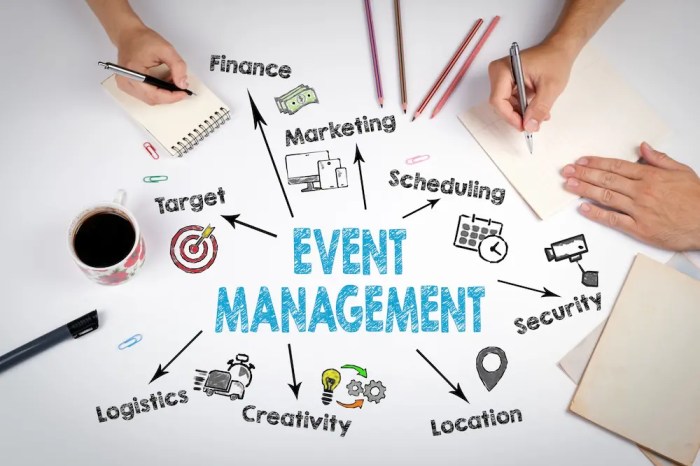Event Planning Tips: Get ready to dive into the world of event planning where meticulous preparation can make or break an event with unexpected twists and insights along the way.
From setting objectives to managing logistics, this guide will equip you with the knowledge needed to plan and execute unforgettable events.
Importance of Event Planning

Event planning is crucial for the success of any event, ensuring that everything runs smoothly and according to plan. Without proper planning, events can easily become chaotic and disorganized, leading to a negative experience for both organizers and attendees.
Ensuring Timely Execution
Proper event planning helps ensure that all aspects of the event are executed on time, from setting up the venue to starting the program. This timely execution can prevent delays and keep the event on schedule, making sure that attendees have a seamless experience.
Managing Budget Effectively
By investing time in detailed event planning, organizers can effectively manage the budget for the event. Planning ahead allows for cost-saving opportunities, negotiation with vendors, and allocation of resources in a way that maximizes the impact of the event without overspending.
Creative Problem-Solving
Event planning also involves anticipating and addressing potential issues that may arise during the event. By thinking ahead and coming up with creative solutions, organizers can mitigate risks and ensure that the event runs smoothly, even in the face of unexpected challenges.
Setting Event Objectives
Setting clear and achievable event objectives is a crucial step in the event planning process. It involves defining specific goals and outcomes that you want to achieve through the event.
Defining objectives helps in planning the event effectively by providing a clear roadmap for the entire planning process. It allows you to focus on what needs to be done, allocate resources efficiently, and measure the success of the event based on predefined criteria.
Examples of Specific Event Objectives
- Increasing brand awareness by 20% among the target audience
- Generating 100 qualified leads for the sales team
- Raising $10,000 for a charitable cause
By setting these specific objectives, event planners can tailor their strategies, select appropriate venues, choose relevant activities, and execute marketing campaigns that align with the desired outcomes. This level of clarity and direction ultimately leads to a more successful and impactful event.
Budgeting for Events
Creating a budget for an event is crucial to ensure that expenses are managed effectively and that the event is executed successfully without going overboard financially.
Importance of Budgeting
- Helps in setting clear financial boundaries and priorities.
- Ensures that funds are allocated wisely to key aspects of the event.
- Prevents overspending and helps in tracking expenses throughout the planning process.
Strategies for Allocating Funds
- Identify key priorities and allocate a larger portion of the budget to these areas.
- Consider potential unexpected costs and set aside a contingency fund.
- Research and compare prices from different vendors to get the best deals without compromising quality.
Tips for Sticking to a Budget
- Track expenses meticulously and update the budget regularly to stay on top of spending.
- Avoid unnecessary expenses by focusing on the core elements that contribute most to the event’s success.
- Communicate budget constraints clearly with all involved parties to ensure everyone is on the same page.
Selecting the Right Venue
When it comes to event planning, choosing the right venue is crucial to the success of your event. The venue sets the tone and atmosphere, and can greatly impact the overall experience of your guests. Here are some key points to consider when selecting a venue for your event.
Criteria for Choosing a Suitable Venue, Event Planning Tips
- Location: Consider the accessibility and convenience of the venue for your guests. Choose a location that is easily reachable and has ample parking or public transportation options.
- Capacity: Ensure that the venue can comfortably accommodate your expected number of guests. It’s important to have enough space for everyone to move around and enjoy the event.
- Amenities: Check if the venue offers the necessary amenities such as audiovisual equipment, catering services, and seating arrangements that align with your event needs.
- Ambiance: The atmosphere of the venue should match the theme and vibe of your event. Whether you’re going for a formal setting or a casual ambiance, make sure the venue complements your vision.
Factors to Consider When Selecting a Venue
- Budget: Determine your budget constraints and look for venues that fit within your financial limits. Be prepared to negotiate prices and ask about any additional fees or charges.
- Date and Time: Check the availability of the venue on your desired event date and time. Make sure there are no scheduling conflicts that could affect your event.
- Reputation: Research the reputation of the venue by reading reviews or asking for recommendations. A venue with a good track record of hosting successful events is more likely to meet your expectations.
- Covid-19 Safety Measures: In the current climate, it’s essential to consider the venue’s safety protocols and measures to ensure the well-being of your guests.
Tips on Negotiating with Venues and Securing the Best Deal
- Be Flexible: Consider booking the venue on off-peak days or times to secure better rates.
- Ask for Discounts: Inquire about any special promotions, discounts, or package deals that the venue may offer for your event.
- Clarify Terms: Make sure to clarify all terms and conditions of the contract, including cancellation policies, payment schedules, and any additional services included in the package.
- Compare Options: Don’t settle for the first venue you find. Compare multiple options to see which one offers the best value for your budget and event requirements.
Event Marketing and Promotion

Marketing and promoting an event is crucial for its success as it helps in creating awareness, generating interest, and driving attendance. Without effective marketing strategies, even the most well-planned events may fail to attract the desired audience.
Significance of Event Marketing
- Increases visibility and awareness about the event
- Helps in reaching the target audience
- Boosts ticket sales and registrations
- Builds anticipation and excitement among potential attendees
Successful Event Marketing Strategies
- Utilizing email marketing campaigns to reach out to potential attendees
- Collaborating with influencers or partners to expand reach
- Creating engaging and visually appealing content for social media platforms
- Offering early bird discounts or special promotions to incentivize early registration
Importance of Social Media in Event Promotion
- Social media platforms provide a cost-effective way to promote events to a large audience
- Allows for direct interaction with potential attendees and facilitates engagement
- Enables the sharing of event details, updates, and behind-the-scenes content easily
- Helps in building a community around the event and encouraging word-of-mouth promotion
Vendor and Supplier Management: Event Planning Tips
When it comes to organizing a successful event, managing vendors and suppliers is crucial for ensuring everything runs smoothly. From selecting the right partners to negotiating contracts and maintaining relationships, every step in the process plays a key role in the overall success of the event.
Selecting Vendors and Suppliers
- Research and identify potential vendors based on their reputation, experience, and reliability.
- Request quotes and proposals from multiple vendors to compare pricing and services offered.
- Check references and reviews to ensure the vendor has a history of delivering high-quality services.
Negotiating Contracts and Agreements
- Clearly define the scope of work, deliverables, and timelines in the contract to avoid any misunderstandings.
- Negotiate pricing, payment terms, and cancellation policies to ensure a fair and beneficial agreement for both parties.
- Include clauses for potential changes or additions to the original agreement to accommodate any unforeseen circumstances.
Maintaining Relationships with Vendors
- Communicate regularly with vendors to provide updates on event details and requirements.
- Show appreciation for their hard work and dedication by acknowledging their efforts and providing feedback on their performance.
- Seek opportunities to collaborate on future events to build a long-lasting partnership that benefits both parties.
Creating Event Timelines
Creating detailed event timelines is crucial for the success of any event. It helps in organizing and executing all aspects of the event smoothly, ensuring that everything runs according to plan. Without a timeline, it’s easy to overlook important tasks, leading to chaos and potential disasters on the day of the event.
Importance of Event Timelines
- Keeps everyone on track: A detailed timeline ensures that all team members and vendors are aware of their responsibilities and deadlines.
- Prevents delays: By mapping out the sequence of tasks and setting realistic timelines, you can avoid last-minute rushes and delays.
- Helps in prioritizing: With a timeline in place, you can prioritize tasks based on their importance and deadline, ensuring that critical elements are taken care of first.
Tips for Creating an Effective Event Timeline
- Start early: Begin creating your timeline as soon as the event is confirmed, allowing ample time for adjustments and revisions.
- Break it down: Divide the timeline into smaller, manageable tasks with specific deadlines to avoid overwhelm.
- Include buffer time: Factor in extra time for unexpected delays or issues that may arise during the planning process.
- Collaborate with the team: Get input from all stakeholders involved in the event to ensure that the timeline is realistic and feasible.
- Review and revise: Regularly review and update the timeline as the event date approaches, making necessary adjustments as needed.
Managing Event Logistics
Managing event logistics is crucial for the success of any event. It involves coordinating and organizing various operational aspects to ensure everything runs smoothly on the day of the event.
Efficient Management Strategies
- Develop a detailed logistics plan outlining all tasks, responsibilities, and timelines.
- Communicate effectively with all stakeholders, including vendors, suppliers, and team members.
- Regularly review and update the logistics plan to address any potential issues or changes.
- Utilize event management software to streamline logistics processes and enhance efficiency.
Coordinating Logistical Aspects
- Transportation: Arrange transportation for attendees, speakers, and staff to ensure timely arrival and departure.
- Catering: Coordinate with catering services to provide food and beverages for the event, taking into account dietary restrictions and preferences.
- Accommodations: Secure accommodations for out-of-town guests or speakers, making sure they have a comfortable stay during the event.








